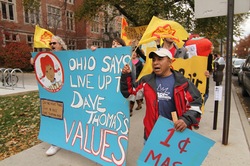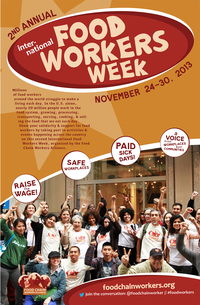It's International Food Workers Week, November 24-30, 2013! This is the second annual week, organized by the Food Chain Workers Alliance every year around Thanksgiving, to lift up the importance of workers in our food system.
When I was younger, I didn't really think about the hands that feed us. While I was in high school, I even worked in a hamburger truck at the Ohio State Fair, but didn't consider the millions of people who are responsible for the food I eat every day.
That's what we're trying to change with International Food Workers Week. With 20 million people in the U.S. working in the food system, and millions more around the world, our economy and our daily sustenance depends on food workers. The national median wage of food system workers is $9.90 per hour. Almost 1/3 of food system workers are paid the federal minimum wage of $7.25 per hour or the tipped minimum wage of $2.13 per hour. And in our survey of over 600 food workers around the U.S., almost one-quarter are paid below minimum wage. As a result of these low wages, food workers use food stamps (now known as SNAP benefits) at 1.5 times the rate of the general workforce.
So, workers around the country are organizing to demand a raise in the minimum wage, a voice on the job, and protections in the workplace. Two of the campaigns that we're calling on the public to support during International Food Workers Week are the Low Pay Is Not OK campaign with fast food workers and the Campaign for Fair Food, organized by the Coalition of Immokalee Workers.
Charles Eden, a 20-year-old fast food worker in St. Louis, has been working at Wendy's for three years now. As a crew worker, he does everything, from food prep to cleaning to cooking. He sometimes trains new staff, including new managers because the turnover of managers is faster than the crew staff.
Charles started off earning $7.35 per hour, and after two years, his pay went up just $.25 to $7.60. Additionally, the lack of a set schedule makes it hard to survive.
In fast food, there's no part-time or full-time. There's no set amount of hours. You work what they give you. I work 40 hours one week, 20 hours another week. It's really frustrating -- I have to pay rent and pay bills.
In addition to working at Wendy's in the mornings, Charles now works at Applebee's in the evenings, just to make ends meet.
Charles has been involved with the St. Louis Can't Survive on $7.35 campaign since it began almost a year ago. The campaign is part of the national Low Pay Is Not Ok campaign. He said he decided to join because "the amount of work that I do in one day doesn't add to what I get paid. When my check comes, it's never enough. But when these companies are profiting billions of dollars per year, then the taxpayers have to subsidize them [for workers who get food stamps and Medicare] ... It's not fair."
Charles feels empowered to be part of this campaign.
I feel like I'm already in a union because they just know that we have the numbers. [The company] can't just do and say what they want anymore.

At the other end of the food supply chain is Emilio Faustino Galindo, a 58-year-old migrant farmworker, husband, and father of five children aged 25-35 years old. When his kids were younger, Emilio worked hard to take care of his family. It wasn't easy. Until recently, Emilio and the other thousands of farmworkers in the tomato fields in Florida were paid just $.50 per 32-pound bucket of tomatoes that they picked. At this pay rate, they were not always guaranteed minimum wage in a typical 10-12 hour workday.
Working as a migrant farmworker for 16 years now, Emilio has also seen how other workers have suffered verbal and physical abuse, sexual harassment and assault, and, in the most extreme cases, modern-day slavery at the hands of labor contractors and growers.
Emilio wanted respect for human rights for himself and his fellow farmworkers, so he joined the Coalition of Immokalee Workers, which had begun as a small group of farmworkers organizing together in 1993. The Coalition has now grown immensely and won Fair Food Agreements with 11 major corporations, including Taco Bell, Subway, and Whole Foods, establishing more humane farm labor standards and fairer wages for farmworkers in their tomato suppliers' operations.
We have won many changes that benefit the workers," Emilio says. "For example, a penny more per pound for the tomatoes we pick, as well as time clocks in the fields to guarantee [payment] of the minimum wage.
The Fair Food Program requires that these companies pay a penny-per-pound premium for all tomatoes that they buy from Florida, which farmworkers receive as a bonus in their weekly paychecks. The Program also provides a number of workplace protections, such as zero-tolerance for sexual harassment and slavery, as well a complaint and resolution process for the workers.
Even with their success, Emilio says that the Coalition continues fighting.
The last major national fast food corporation that hasn't signed on is Wendy's. So the struggle continues because even though 90 percent of the tomato growers have joined the Fair Food Program, there are still some growers that haven't come on board. We need Wendy's to join to commit to only buying from growers who are part of the Program and to stop buying from farms that violate our human rights.
Charles and Emilio are just two of the thousands of workers in the U.S. standing up to corporations like Wendy's, Walmart, Darden (owner of Olive Garden, Red Lobster, and other chains), McDonald's and many others and organizing for respect, for higher wages, and for what should be basic benefits like paid sick days. During this International Food Workers Week, sign our petition to raise the minimum wage and go to our website www.foodchainworkers.org to find other in-person and online actions to be a part of the growing food workers movement!
Photo Credit: ciw-online.org

